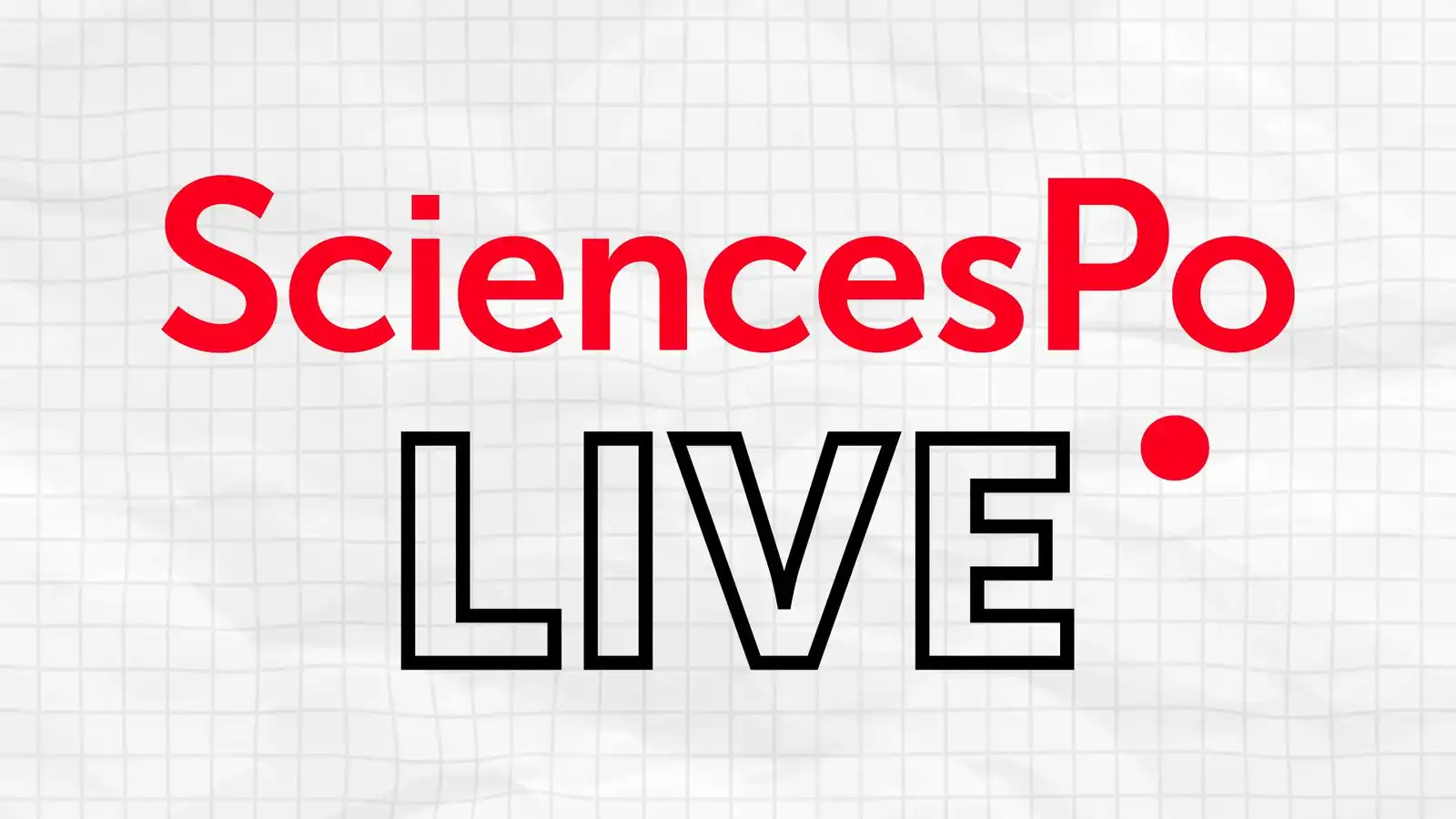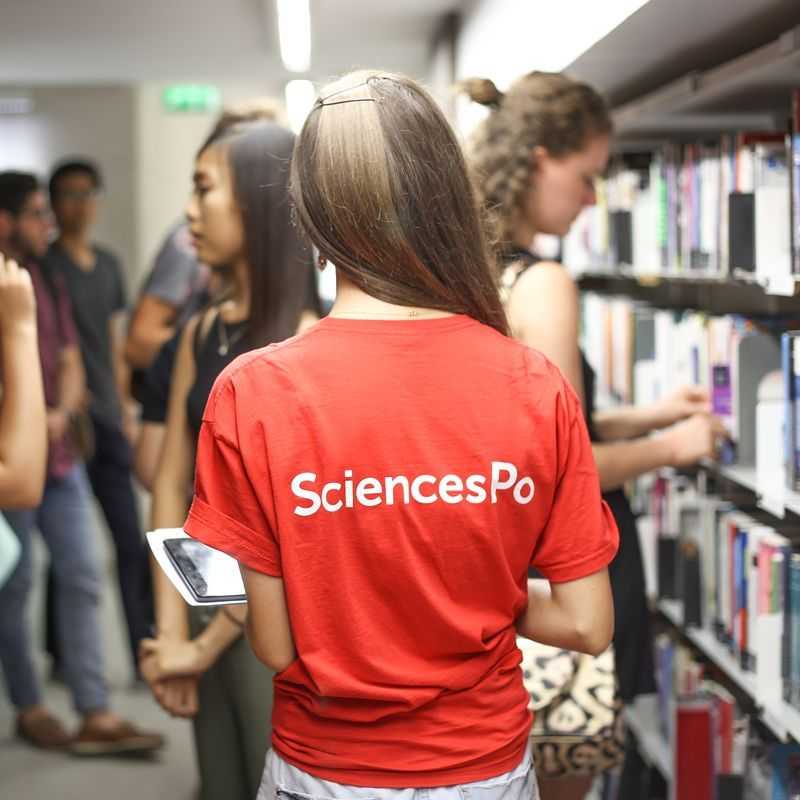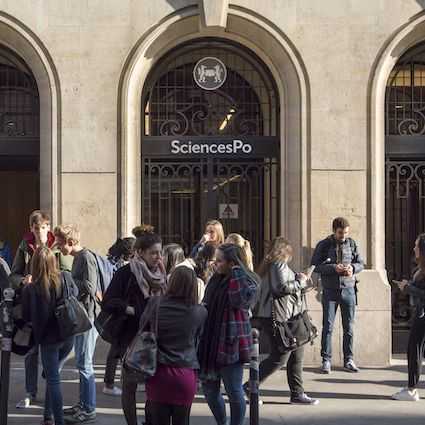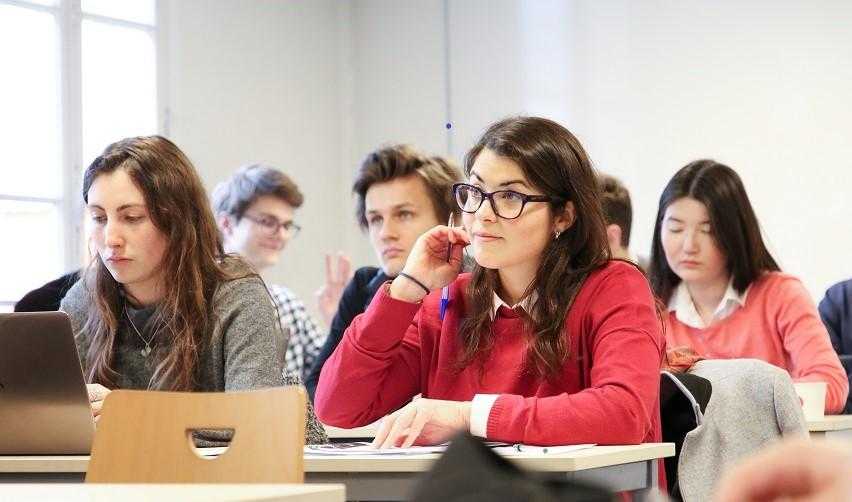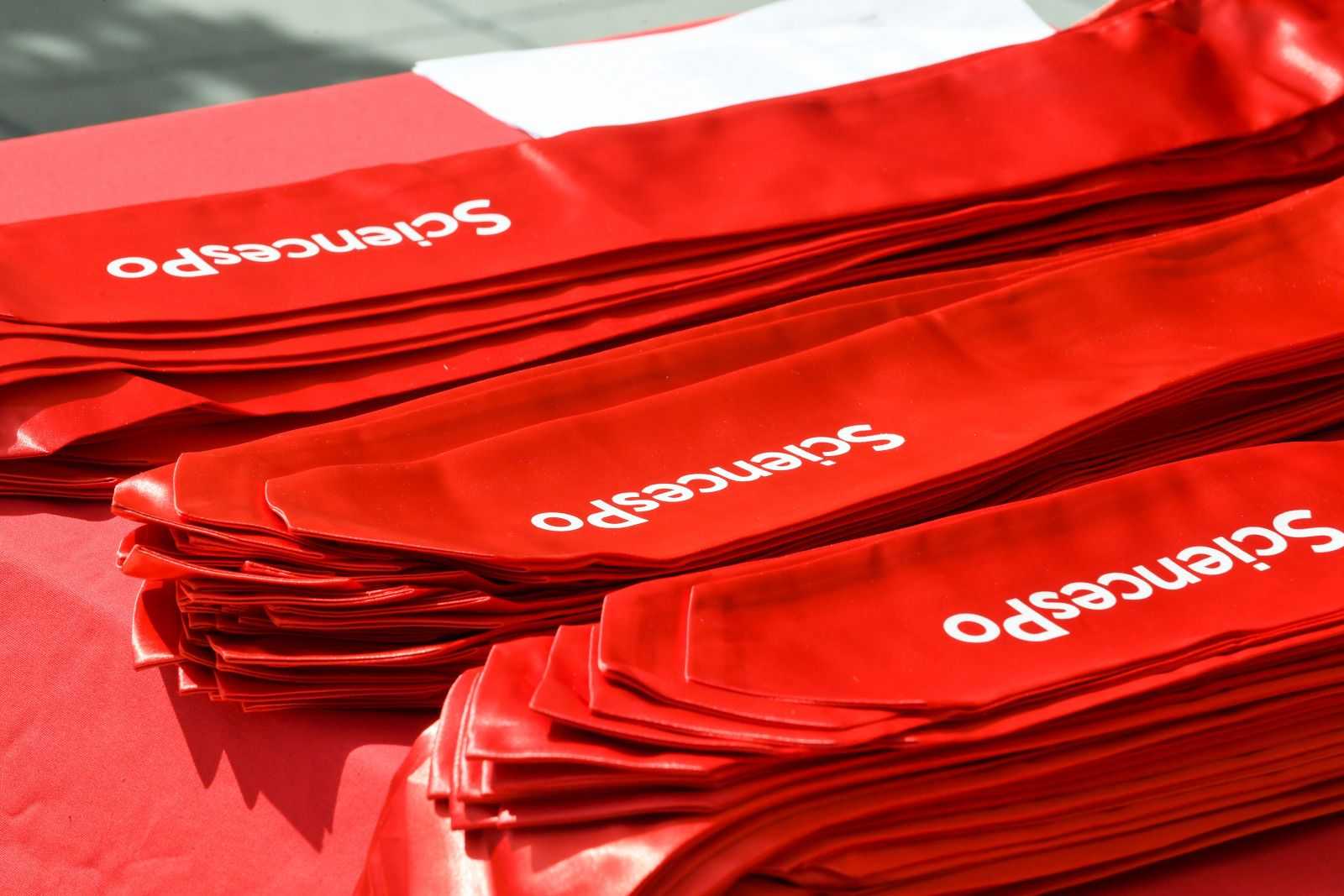
Home>Academics>Master Programs>International Governance and Diplomacy
Master in International Governance and Diplomacy
Two-year Master's
Programme in English
120 ECTS minimum
Information Sessions: Masters

Discover all the Master's programs and admissions procedures during our many webinars dedicated to future applicants.
General objectives
In an era of shifting power dynamics, transnational challenges, and evolving institutions, the Master in International Governance and Diplomacy bridges the disciplines of political science, international law, economics, management and diplomacy to prepare students for impactful careers in multilateral organizations, foreign ministries, non-governmental organizations, consultancies and global policy think tanks. This program is a highly practical program designed to immerse students in real-world challenges through hands-on, experience-based learning. The curriculum emphasizes applied knowledge, with class assignments that simulate the complexities of international negotiations, policy-making, and diplomatic strategy across the globe and throughout different sectors.
Main orientations and specific features
The Master in International Governance and Diplomacy is designed for emerging professionals committed to shaping global policy and advancing international cooperation through informed policy-making and strategic diplomacy.
Through our policy analysis blocks, the governance issues are analysed through the lens of policy design, implementation to evaluation on a wide spectrum of topics—from institutional reform and regulatory frameworks to transnational cooperation and crisis response. These modules are designed to challenge the students the way they think and expand their toolkits.
Diplomacy is one of the central pillars to the program as a versatile tool for influence, negotiation, and coalition-building. This program teaches diplomacy as a method by high-level practitioners in the field (ie: diplomats, directors of international or governmental organizations and world-renowned academics) and practical component is emphasized in all courses.
Governance is never one-dimensional. Therefore, our curriculum integrates essential blocks in International Law, Economics, and Management—disciplines that are foundational to effective policy-making and institutional leadership. This interdisciplinary approach is not an add-on; it’s a core strength of the program, equipping you with the intellectual versatility needed to tackle real-world challenges.
While our curriculum offers a comprehensive foundation in governance and policy analysis, we expect the students to arrive with a clear sense of thematic interests and career direction. Through case studies, simulations, and expert-led seminars, the students will learn to craft policy, mediate conflict, and lead with integrity in international arenas. The students in the program will be encouraged to engage critically with the material through the lens of their chosen focus area, building a coherent trajectory that aligns with their professional goals.
Programme structure
Details regarding PSIA’s general program structure.
Students starting the International Governance and Diplomacy program will follow the program structure below:
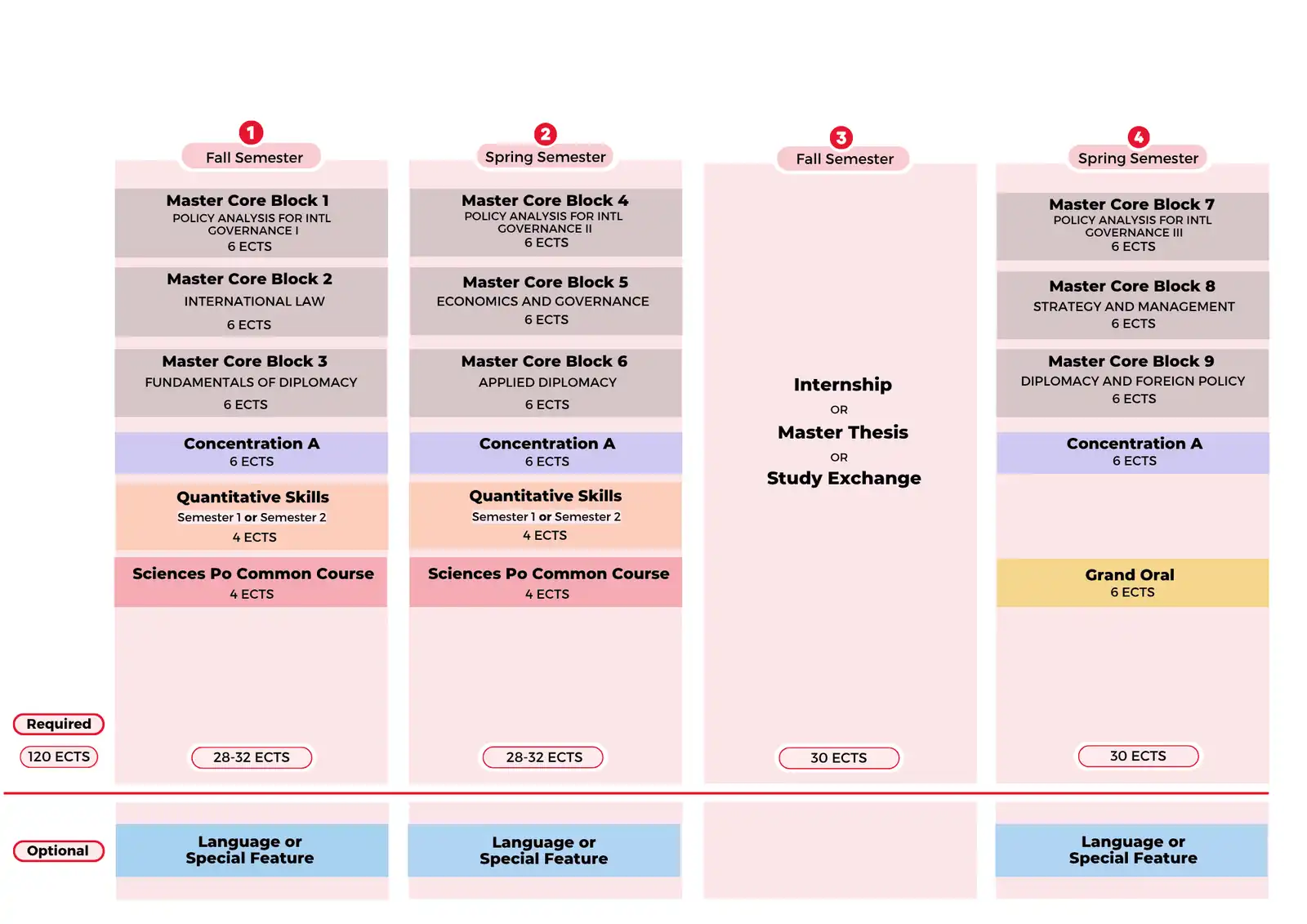
Download the program structure (PDF, 57 Kb).
The degree structure for students in the following programs can be found at: Dual Degree program, Joint Master program and One-Year Master program.
Diplomacy as a mandatory concentration
The Master in International Governance & Diplomacy program incorporates Diplomacy as the first concentration for all students. Due to the fact that this program integrates the study of diplomacy alongside international governance (i.e. policy analysis, economics, international law and management), students will only select one thematic or regional concentrations (excluding diplomacy).
Students in the Dual degree, Joint Master and One-Year Master programs will automatically follow the Diplomacy concentration for the program as their one concentration (see program structures for the respective programs above).
Courses
Career Opportunities
Graduates from this program pursue impactful roles in:
- International organizations and multilateral institutions
- Global corporations and consultancies
- Ministries of foreign affairs and national governments
- Advocacy groups and NGOs
- Think tanks and research centers
Scientific advisor
Thierry Balzacq is a Professor of International Relations at Sciences Po and Professorial Fellow at CERI-Sciences Po, Paris. He is also the Director of Graduate Studies in Political Science at the School of Research and Scientific Advisor of the Master in International Governance and Diplomacy, at PSIA. He is member of the National Council for Universities (CNU), Section 4 (Political Science).
In 2024, Thierry Balzacq conducted a study for the development of the future EU Diplomatic Academy (EUDA), on behalf of the diplomatic service of the European Union – the European External Action Service (EEAS). He was formerly the Scientific Director at the French Ministry of Defense’s research center (2014-2016).
Thierry Balzacq was the 2022/2023 Susan Strange Professor at the London School of Economics and Political Science (LSE) and the George Soros Distinguished Visiting Professor at Central European University (CEU);a former visiting fellow at the Australian National University (2017-2018) and held various appointments at McGill, the National University of Singapore (NUS), the Diplomatic Academy of Vietnam, The International Relations Institute of Cameroon (IRIC), Aberystwyth, the University Abdou Moumouni of Niamey (Niger), and ENA (now, INSP).
Thierry Balzacq holds a PhD from the University of Cambridge and completed his postdoctoral studies at Harvard University. He sits on the editorial boards of Security Studies and Critical Studies on Security. Balzacq is an elected member of the Governing board of the European International Studies Association (EISA).
Testimonials from graduates
- Jacques, Associate, Tony Blaire Institute for Global Change
- Sarah, Apprentice, Diversity & Inclusion, Axa France
- Lora, Associate Programme Officer, UNESCO
- Pauline, Permanent representation of Belgium to the EU
- Nora, International Consultant, UN DESA
- Bilen, Innovation and Experimentation Project Manager within the strategy department at the French Ministry of Labour, Employment and Economic Inclusion
- Giulio, Political Affairs Officer, Syria Team of the UN Department of Political and Peacebuilding Affairs
- Fangzhou, Associate Web Officer, UNESCO, International Institute for Educationnal Planning
- Alexis, Analyst, The World Bank Group
- Johannes, AI Policy Advisor, OECD
- Marianna, Chief of International Affairs and Cooperation of the Office of the First Lady of the Republic of El Salvador
- Boyun, Investment Officer, AIIB
- Mira, co-founder, Centre de Formation et d'Action Contre le Faim (CFAF)
- Sylvana, Associate Project Officer, UNESCO
- Asgerdur, Director of Communications and Startegy, The Arctic Circle
- Kannelle, Head of Sciences Po's East Africa Office
- Antonio, Data Specialist, Solidarités International
- Mattia, Blue Book Trainee, European Commission
- Gaia, Public Policy Consultant, PwC and Co-founder of the Carbon Neutrality Challenge
- Melina, Program Development and Strategist, Ecogenia
- Mariane, Junior Policy Analyst, OECD
Discover PSIA 2025 Summa Cum Laude:
CONTACTS
Academic Advisor: Mimi Maung-Trentin and Tingyu Li, office hours (by appointment)
Academic Assistant: Elvedina Cappelle
- Monday, Tuesday and Thursday 9:30-12:45 and 2:15-4:45;
- Wednesday and Friday 9:30-12:45.
Key information about the application process (requirements, documents, deadlines and calendar, etc) can only be found on Sciences Po’s Admissions website.
